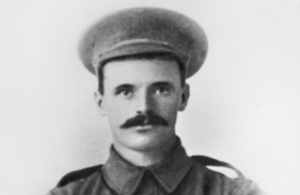WW1 Australian VC recipient Martin O'Meara
The story of Australian World War One Victoria Cross recipient Martin O'Meara.

Martin O'Meara [Credit: Australian War Memorial H12763]
66 men from Australia received the Victoria Cross, Britain’s highest award for gallantry, during the First World War. As part of the Centenary Commemorations the people of the United Kingdom marked their gratitude to those courageous men by presenting a bronze memorial plaque to their home country engraved with their names. The plaque is now displayed at the Australian War Memorial. This archive tells their stories.
Name: Martin O’Meara
DOB: 6 November 1885
Place of Birth: County Tipperary, Ireland
Date of Action: 9 to 12 August 1916
Place of Action: Pozières, France
Rank: Private
Regiment: 16th Battalion, Australian Imperial Force
Martin O’Meara was born in County Tipperary Ireland on 6 November 1885, but emigrated to Australia as a young man where he worked as a labourer and sleeper-cutter in Western Australia. He joined the Australian Imperial Force in August 1915, and fought in the Somme on the Western Front with the 16th Battalion.
Private O’Meara was awarded the Victoria Cross for most conspicuous bravery during fighting near Pozières, France between 9 to 12 August 1916. The 16th Battalion had attacked the German position at Mouquet Farm, and they responded with a heavy artillery bombardment which resulted in severe casualties. As a stretcher bearer he showed exceptional courage disregarding his own safety to rescue wounded men. As his citation explains:
During four days of very heavy fighting he repeatedly went out and brought in wounded officers and men from “No Man’s Land” under intense artillery and machine gun fire. He also volunteered and carried up ammunition and bombs through a heavy barrage to a portion of the trenches which was being heavily shelled at the time. He showed throughout an utter contempt of danger, and undoubtedly saved many lives.
O’Meara was later wounded three times during the rest of the war, and his experiences led to a complete breakdown in his health. He spent the rest of his life in hospital, and died in Perth in 1935. He was buried with full military honours.